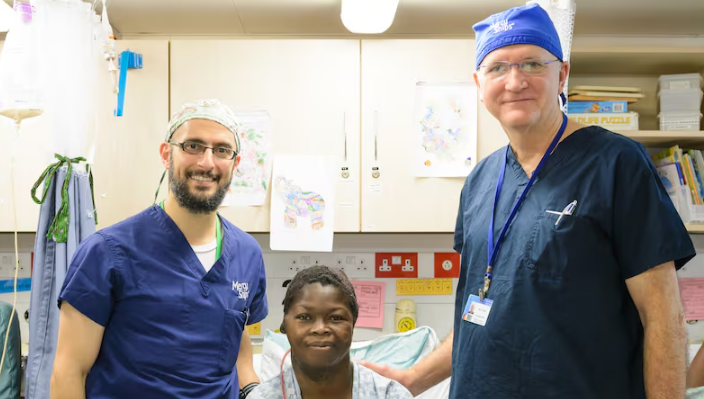This month, as Mark Shrime stepped onto the world’s largest civilian floating hospital off the coast of Sierra Leone, he knew that soon a patient on his long surgical list might cause him sleepless nights. There’s always one case that feels more urgent than expected, causing the head and neck surgeon, who has dedicated 17 years to Mercy Ships, to wrestle with self-doubt.
“This was the first time I truly thought: ‘Oh, I am different. I am the diversity,’” Shrime explained. This feeling compels him to prepare meticulously, pouring over old textbooks, visualizing the surgical plan repeatedly, and thinking through every possible scenario, including the difficult choice of what to do if the tumor cannot be removed.
Speaking about his recent surgery aboard the Global Mercy, Shrime said, “I just finished with him about nine minutes ago. It was hard, but it went well. He is a young man, around 23, with a very large neck tumor,” he said, cupping his hand under his chin to illustrate the size of the mass.
“I scheduled three hours for the surgery, but it took five. Thankfully, everything came out as it should, and now we just hope his recovery goes smoothly.”
The factors complicating each case can vary significantly. Sometimes, a tumor can grow around important structures, engulfing the area between the esophagus and the skin, wrapping around the jugular vein, pushing the carotid artery back toward the spine, obstructing the airway, or impacting crucial nerves. In severe instances, the tumor can replace entire sections of the jawbone.
Limited Access to Surgical Care
A common thread in all these cases is the chronic lack of access to surgical care. This situation allows what Shrime, the international chief medical officer of Mercy Ships, describes as an “occupying force” in the neck to grow unchecked.
It might seem unbelievable that barriers to surgical care lead to more deaths in low- and middle-income countries than HIV, malaria, and tuberculosis combined, but Shrime asserts that research backs this claim.
“Two-thirds of the world’s population cannot access surgery when they need it. The reason why the case I just handled was so difficult was that the poor guy had that tumor growing for years—not because he wanted to, but because he had no way to get surgery,” he pointed out.
“That’s why the work we do is so essential; people shouldn’t have to wait for a ship to arrive to get the surgeries they need. Their healthcare systems should be capable of providing for them.”
Surgery is often seen as something to be addressed only after tackling malnutrition, maternal health, and infectious diseases. “But I would never choose to live in a country without access to surgery, and neither would anyone else. So why is it considered a luxury for everyone else?”
Shrime speaks passionately about learning to listen to his patients in sub-Saharan Africa, diagnosing and treating their life-threatening tumors, while also addressing the systemic injustices that allow such situations to persist.
Transitioning to Global Health Advocacy
The shift from a successful yet hesitant physician in Boston to a global health advocate took Shrime two decades, a journey he shares in his book, Solving for Why. This book is filled with stories that led him to recognize his purpose and encourages readers not to forfeit their passions for job security, prestige, or financial gain.
“My purpose is to help people reclaim their rightful place in humanity,” he shared. “I believe the best way to find our ‘why’ is by stepping outside ourselves. Everyone has their own reasons. I have these skills, and I want to use them to help those who are less fortunate or marginalized.”
Born in Beirut to Melkite Catholic parents in 1974, Shrime’s long journey to self-discovery began when he was just a year old, during the Lebanese civil war. His family survived a terrifying experience at a militia checkpoint, which deeply influenced his sense of purpose.
After escaping to Texas, Shrime felt that his parents did not survive the war just for him to live an ordinary life. Like many first-generation sons of immigrants in the U.S., he felt pressure to become a doctor, lawyer, or face being labeled a failure.
Finding Joy in Unlikely Places
In his thirties, Shrime found a passion for rock climbing and decided to apply to compete on the show American Ninja Warrior. “I watched athletes tackle tough obstacles and thought I’d give it a shot,” he recalled. In 2016, he applied alongside 75,000 hopeful contestants.
On the day of his third and final chance to qualify, he arrived at the course early, filled with anxiety. “I had all night to think about how I needed to improve. But three strides in, I stepped off the course out of sheer anxiety. That was the end of my Ninja Warrior journey,” he explained.
Despite the disappointment, Shrime credits the experience with freeing him from fear and enabling him to tackle challenges in his professional life.
His childhood home was in a typical suburban neighborhood of Dallas, Texas, filled with strip malls, banks, grocery stores, and Tex-Mex restaurants. Years later, he would face a terrifying encounter, being robbed at gunpoint for $18 after work.
His father, George, an engineer, and his mother, Souad, raised their three children with an “uneasy balance,” homeschooling them in Arabic and French while encouraging them to fit in and speak English fluently.
Growing up as a bookish child among his more outgoing siblings, Maria, a former physical therapist and recent contestant on Survivor, and Ryan, an actor and director, Shrime eventually overcame his shyness to become a public figure.
“We’ve never really talked about it as siblings, but we all share an attitude of: ‘This might be a silly choice, but let’s go for it.’ That mindset serves us well at times and poorly at others.”
Pursuing a Greater Purpose
For a time, Shrime embraced his passion for music, practicing guitar constantly and sending letters to the Christian rock band Petra, expressing his desire to join them. “Their music had a deeper meaning that resonated with my beliefs. I loved listening to their songs while feeling like I was worshiping.”
He had dreams of becoming a missionary like the 19th-century British Baptist Hudson Taylor or perhaps a philosopher or linguist—anything but a doctor. However, his father insisted that none of his children pursue a field without purpose.
Educated at Cistercian Preparatory School, Shrime graduated at the top of his class. He faced teasing for his unconventional lunches, but he only fully recognized his differences after the Gulf War began. One day, a classmate drove into the parking lot blasting a song meant to offend Arabs. “That was the first time I really thought: ‘Oh, I am different. I am the diversity,’” he recalled.
Facing Rejection with Resilience
While at Princeton, Shrime applied to medical schools across the U.S., taping rejection letters to his dorm wall. “I think I secretly hoped I’d receive rejection letters so I could escape that obligation,” he admitted.
Ultimately, he received acceptance letters from two schools, including the University of Texas Southwestern Medical Center. “I failed at failing,” he said, smiling.
Just weeks before graduating summa cum laude, Shrime faced a significant loss when his father died from non-Hodgkin’s lymphoma at 55. Spending the summer on research, he never got the chance to say goodbye.
“I’ve changed, my family has changed, and the world has changed. I often wonder what he would think of the paths my siblings and I have taken. I hope he would be proud, and my mother has continued that legacy for 28 years without him.”
Commitment to Global Health
During a demanding residency at New York Presbyterian Hospital, Shrime was invited to an exhibition showcasing Mercy Ships’ work. The photographs he saw that day changed his life forever.
He vividly recalls the images of “health restored, sight regained, and lives improved,” all thanks to surgery. The very next day, he signed up to volunteer with the organization.
In July 2008, after six months of travel, Shrime boarded the Africa Mercy, where he discovered his true purpose. “I saw so many patients with head and neck tumors, and it felt like I was finally doing what I was meant to do all those years,” he said.
Among the many patients, one that stood out was a three-year-old named Emmanoel, who had a life-threatening tumor removed thanks to Shrime’s skills. “That experience was transformative,” he shared.
A Journey of Transformation
After completing additional fellowships, Shrime worked as an attending surgeon at Boston Medical Center before joining Mercy Ships full-time. He now spends part of each year working aboard the Global Mercy or the Africa Mercy, returning to the communities he serves.
“The operating room feels like home, and it reminds me of why I chose this path,” he stated. “One day, I’ll have to say goodbye to Mercy Ships, either because I retire or can no longer perform surgery, and that will be a sad day.”
He is determined to address the lack of healthcare providers in Africa, where an estimated five million are missing. “I want to help change that,” he stated.
Full Circle
For six to twelve weeks each year, Shrime returns to Mercy Ships, where he feels a sense of belonging within the close-knit crew. He treasures the opportunity to engage in “the beautiful dance of the operating room,” a reminder of why he started this journey 17 years ago.
“They say there’s a day you lift your child for the last time, and you don’t realize it. I feel there will be a day when I can no longer serve with Mercy Ships, and it will be hard for me,” he said, a somber tone creeping into his voice. “That will be sad.”





